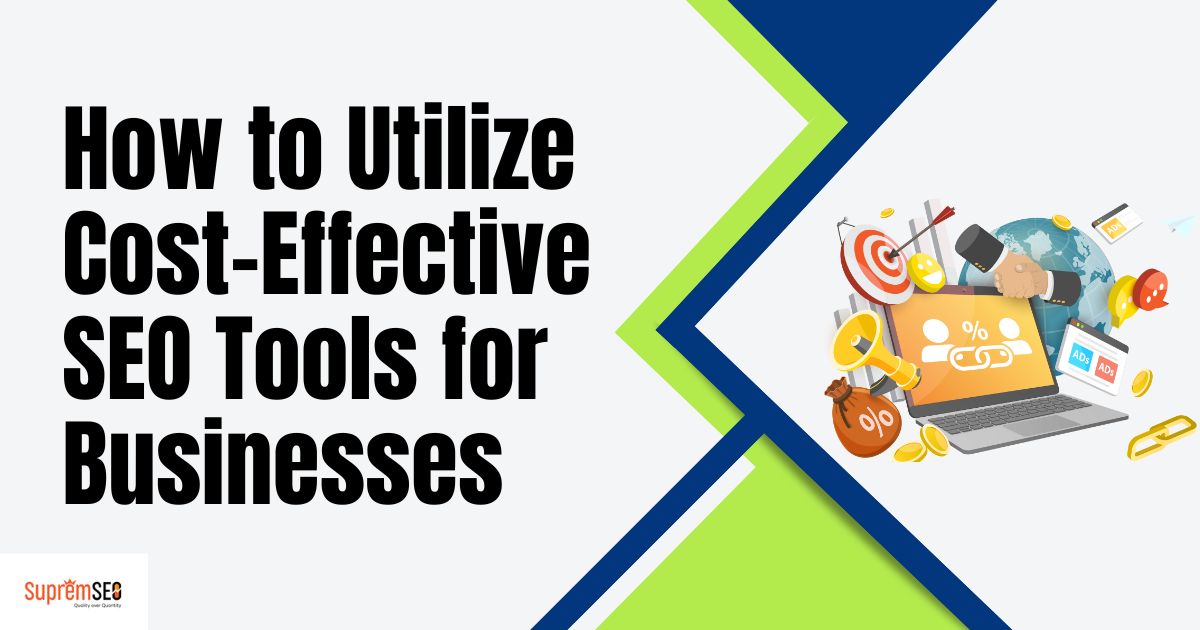Search engine optimization (SEO) is an essential aspect of digital marketing that helps businesses rank higher in search engine results pages (SERPs). However, SEO can be a costly endeavor, especially for small businesses operating on a limited budget. Fortunately, there are cost-effective SEO tools that businesses can use to improve their online visibility without breaking the bank.

One of the best SEO tools for cost-effective optimization for small businesses is Google Search Console. This free tool provided by Google offers a suite of features to analyze and enhance a website’s performance in Google Search. It helps businesses monitor their website’s traffic, track their website’s ranking on Google, and identify technical issues that may be affecting their website’s performance. By utilizing Google Search Console, small businesses can improve their website’s visibility, attract more traffic, and increase their chances of ranking higher in SERPs.
Another cost-effective SEO tool for small businesses that can be utilized is SEMrush. It is a powerful SEO software that offers a wide range of features to help businesses improve their online visibility. SEMrush offers keyword research, site audit, backlink analysis, and competitor analysis tools, among others. With SEMrush, small businesses can optimize their website’s content, identify new keywords to target, and monitor their website’s performance. Overall, utilizing cost-effective SEO tools can help small businesses improve their online visibility and attract more traffic to their website without spending a fortune.
Understanding SEO and Its Importance for Small Businesses

The Basics of SEO
Search Engine Optimization (SEO) is the process of optimizing a website to rank higher in search engine results pages (SERPs). It involves various techniques to improve the visibility of a website and attract organic traffic. SEO is crucial for small businesses as it helps them compete with larger businesses on a level playing field.
SEO involves various techniques such as keyword research, on-page optimization, link building, and content creation. Keyword research helps businesses identify the search terms their target audience is using to find their products or services. On-page optimization involves optimizing the website’s content, structure, and HTML code to make it more search engine-friendly. Link building involves acquiring backlinks from other websites to improve the website’s authority and credibility. Content creation involves creating high-quality content that provides value to the target audience.
Why SEO is Crucial for Small Business Growth
Local SEO is crucial for business owners of small businesses as it helps them improve their visibility within their specific communities and attract organic traffic. Organic traffic is traffic that comes from search engine results pages (SERPs) and is not paid for. This traffic is highly targeted and has a higher conversion rate than other types of traffic. By optimizing their website for SEO, small businesses can attract more organic traffic and improve their chances of converting visitors into customers.
SEO is also cost-effective compared to traditional advertising methods. While it requires an initial investment, the long-term benefits far outweigh the costs. Unlike traditional advertising methods that require ongoing payments, SEO can continue to attract organic traffic without significant recurring expenses.
In conclusion, SEO is a crucial aspect of small business growth. By understanding the basics of SEO and implementing effective SEO strategies, small businesses can improve their visibility, attract organic traffic, and compete with larger businesses on a level playing field.
Identifying the Right SEO Tools

There is a wide range of SEO tools available, both free and paid. Choosing the right tools can significantly improve the effectiveness of your SEO efforts. Here are some factors to consider when identifying the right SEO tools for your business.
Free vs. Paid SEO Tools
One of the first decisions to make is whether to use free or paid SEO tools. Free tools like Google Search Console and Google Analytics can provide valuable insights into your website’s performance. However, paid tools like SEMrush, Screaming Frog, and Ahrefs offer more advanced features and data analysis capabilities.
While free tools can be a good starting point, paid tools can help you take your SEO efforts to the next level. For instance, SEMrush provides keyword research, backlink analysis, and site audit features, while Screaming Frog focuses on technical, back-end site audits. Ahrefs, on the other hand, offers detailed competitor analysis and content research tools.
Top SEO Tools for Different Needs
Different businesses have different SEO needs, and there are various tools available to meet those needs. Here are some of the top SEO tools for different purposes:
- Keyword Research: SEMrush, Ahrefs, Google Keyword Planner
- On-Page Optimization: Yoast SEO, Moz Pro, SEOptimer
- Technical SEO: Screaming Frog, Google Search Console, SEMrush
- Backlink Analysis: Ahrefs, Majestic, Moz Pro
When choosing SEO tools, it’s essential to consider your business’s specific needs and goals. For instance, if you want to improve your website’s technical SEO, tools like Screaming Frog and Google Search Console can be helpful. If you’re looking to conduct an in-depth competitor analysis, Ahrefs may be the right choice.
In conclusion, identifying the right SEO tools is crucial for businesses looking to improve their online visibility. By considering factors like free vs. paid tools and specific business needs, you can choose the tools that will help you achieve your SEO goals.
Implementing SEO Strategies for Maximum Impact
To maximize the impact of SEO strategies, businesses need to implement a combination of different techniques. Here are some key areas to focus on:
Keyword Research and Optimization
Keyword research and optimization, including keyword tracking, are critical to any SEO strategy. By identifying the keywords that potential customers are using to search for products or services, businesses can tailor their content to meet those needs and continuously monitor their performance. Keyword optimization involves using those keywords appropriately in page titles, meta descriptions, content, and more.
To help with keyword research and optimization, businesses can use cost-effective SEO tools such as Google Keyword Planner or Moz Keyword Explorer. These tools provide valuable insights into keyword volume, competition, and related terms.
Technical SEO and Site Audits
Technical SEO involves optimizing the technical aspects of a website to improve its search engine ranking. This includes optimizing site speed, mobile responsiveness, and site architecture. Site audits are also important to identify any technical issues that may be impacting SEO.
Tools like Screaming Frog and Google Search Console can help businesses identify technical issues and improve their website’s performance.
Building Quality Backlinks
Backlinks are links from other websites that point to a business’s website. Building quality backlinks is an important part of any SEO strategy, as they signal to search engines that a website is authoritative and trustworthy.
To build quality backlinks, businesses can use cost-effective SEO tools like Moz Link Explorer or Ahrefs Backlink Checker. These tools provide insights into a website’s backlink profile, as well as opportunities to build new backlinks.
By focusing on these key areas, businesses can implement cost-effective SEO strategies that drive results and improve their online visibility.
Measuring and Analyzing SEO Performance
Measuring and analyzing SEO performance is crucial for businesses to understand how their website is performing in search engine results pages (SERPs). By tracking key metrics and analytics, businesses can adjust their campaigns based on data to improve their rankings and drive more traffic to their website.
Key Metrics and Analytics
There are several key metrics and analytics that businesses should track to measure their SEO performance. These include:
- Keyword rankings: Tracking the rankings of target keywords is important to understand how well a website is performing in search results for specific queries.
- Organic traffic: Monitoring organic traffic can help businesses understand how many visitors are coming to their website from search engines.
- Bounce rate: Bounce rate measures the percentage of visitors who leave a website after viewing only one page. A high bounce rate can indicate a poor user experience or irrelevant content.
- Conversion rate: The conversion rate measures the percentage of visitors who complete a desired action on a website, such as making a purchase or filling out a form.
- Backlinks: Backlinks are links from other websites to a business’s website. Monitoring backlinks can help businesses understand how well their website is trusted and respected by other websites.
By tracking these metrics and analytics, businesses can gain insights into their website’s performance and adjust their SEO campaigns accordingly.
Adjusting Campaigns Based on Data
Once businesses have collected data on their website’s performance, they can use this information to adjust their SEO campaigns. For example, if a website’s bounce rate is high, businesses can analyze their website’s user experience and make improvements to reduce the bounce rate. If a website’s conversion rate is low, businesses can analyze their website’s content and call to action to make improvements that encourage visitors to take action.
Google Analytics is a powerful tool for tracking these metrics and analytics. By setting up custom reports and dashboards, businesses can quickly access the data they need to make informed decisions about their SEO campaigns.
In conclusion, measuring and analyzing SEO performance is essential for businesses to improve their rankings, drive more traffic to their website, and ultimately increase revenue. By tracking key metrics and analytics and adjusting their campaigns based on data, businesses can optimize their SEO efforts and achieve long-term success.
Frequently Asked Questions
What are the best free SEO tools available for small businesses?
Small businesses can use various free SEO tools to optimize their websites. Google Analytics and Google Search Console are two essential tools that provide valuable insights into website traffic, user behavior, and the performance of specific urls. Other popular free SEO tools include MozBar, Keyword Tool, and Yoast SEO. These tools can help small businesses analyze their website’s performance, conduct keyword research, and optimize their content for search engines.
How can small businesses optimize their websites for SEO without overspending?
Small businesses can optimize their website for SEO without overspending by focusing on creating quality content, conducting keyword research, and building high-quality backlinks. By creating valuable content that answers users’ queries, small businesses can attract organic traffic to their websites. Additionally, conducting keyword research can help them identify relevant keywords and phrases to target in their content. Building high-quality backlinks from reputable sources can also improve a website’s search engine ranking.
Which affordable SEO services provide the most value for small businesses?
Small businesses can benefit from affordable SEO services that provide value for their money. Some affordable SEO services that provide the most value include keyword research, on-page optimization, and link building. By conducting thorough keyword research, small businesses can identify relevant keywords to target in their content. On-page optimization involves optimizing website content, meta tags, and images for search engines. Link building involves acquiring high-quality backlinks from reputable sources to improve a website’s search engine ranking.
How can businesses effectively measure their SEO success using Google Analytics?
Google Analytics provides valuable insights into a website’s traffic and user behavior, making it an essential tool for measuring SEO success. Businesses can use Google Analytics to track their website’s traffic, user engagement, and conversion rates. By setting up conversion goals and tracking them, businesses can measure the effectiveness of their SEO strategies and make data-driven decisions to improve their website’s performance.
What are some cost-effective strategies for improving a website’s SEO ranking?
Some cost-effective strategies for improving a website’s SEO ranking include creating quality content, conducting keyword research, and building high-quality backlinks. By creating valuable content that answers users’ queries, businesses can attract organic traffic to their websites. Additionally, conducting keyword research can help them identify relevant keywords and phrases to target in their content. Building high-quality backlinks from reputable sources can also improve a website’s search engine ranking.
How can businesses find reputable and affordable SEO companies to enhance their online presence?
Businesses can find reputable and affordable SEO companies by conducting thorough research and asking for referrals. They can start by searching for SEO companies online and reading reviews from past clients. Additionally, they can ask for referrals from other businesses in their industry or from their network. It’s important to choose an SEO company that has experience working with businesses in their industry, and that provides transparent pricing and communication.










